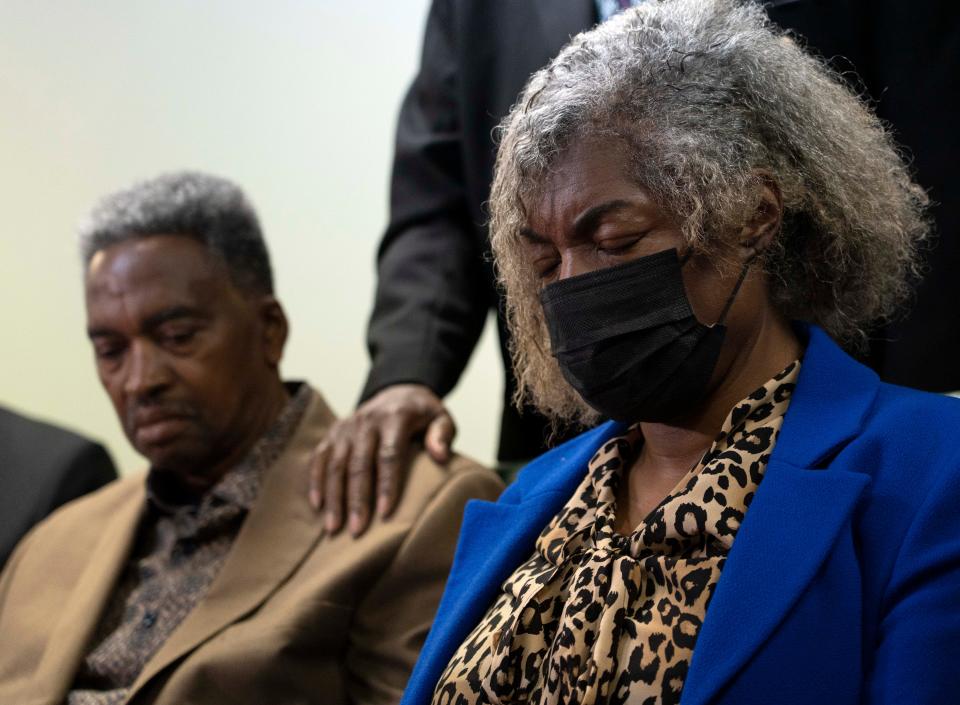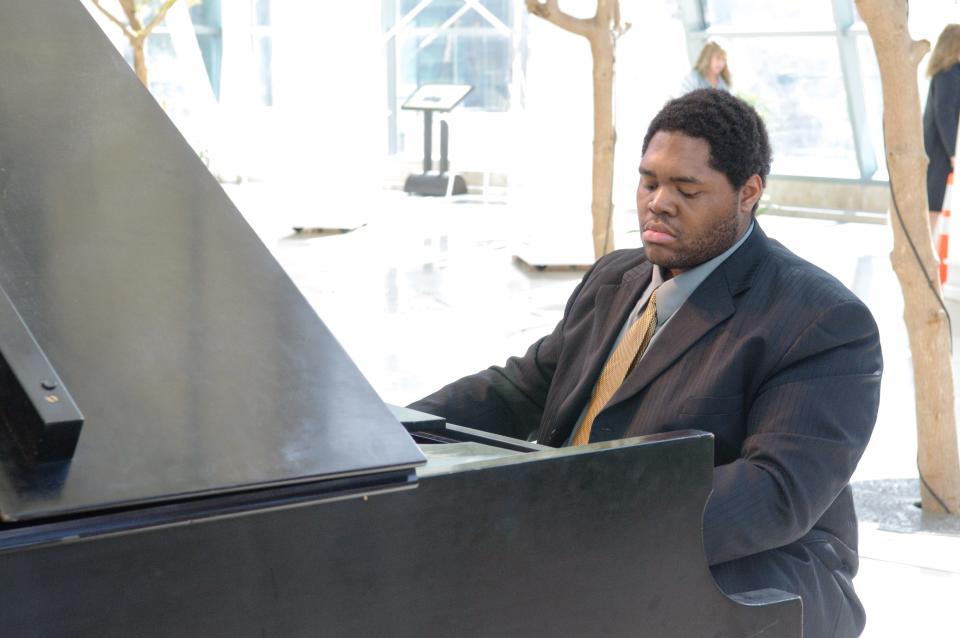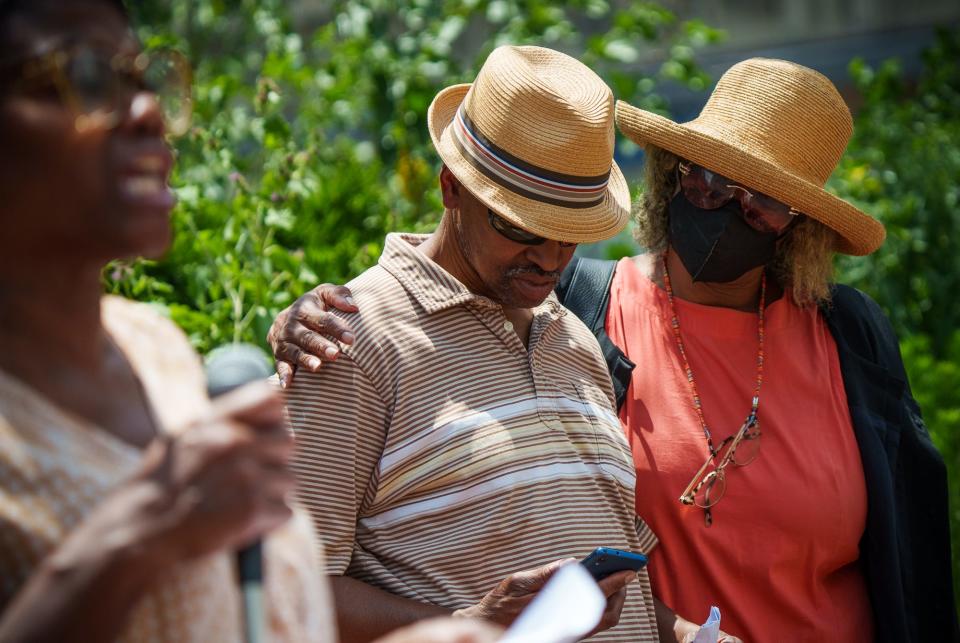Herman Whitfield III's mother told police she was concerned officers would kill son
On the night of April 25, 2022, before her 39-year-old son was pronounced dead after being restrained by Indianapolis Metropolitan Police Department officers, Gladys Whitfield asked one of the officers responding to an emergency call at her home if they would kill her son, Herman Whitfield III.
"They're not going to kill him, are they?" Gladys said.
"I'm sorry, what?" said IMPD Officer Dominique Clark.
"Because, because he's..." Gladys said.
"We're just talking to him ma'am," Clark responds.
"I know. I know. You're calling somebody else. I'm just really concerned," Gladys said.
"Well, wait. Okay, well we're just talking to him. Nobody's got anything out that would cause him harm. Okay? Okay," the officer says.
Later that night, her son would be pronounced dead.
More:'Phenomenally talented': Oberlin grad Herman Whitfield III remembered as genius pianist
The exchange is captured in police body cam footage Whitfield's family obtained through a federal court order directing IMPD and the city of Indianapolis to hand over all unedited video showing what happened the night Whitfield died. His family released the videos Saturday.
Attorneys for Whitfield's family said the unedited footage ― 11 individual videos mostly spanning between 40 minutes and an hour in length ― counters the narrative put forth by IMPD in a narrated 14-minute critical incident video released in June.
In addition to individual videos, the family also released a roughly 22-minute compilation of six IMPD body cam videos with written narration and captions about IMDP General Orders spliced throughout.
"The videos conclusively show that Herman was vulnerable, unarmed, naked and undergoing a mental health crisis and never threatened the officers either verbally or physically," a press release accompanying the release said. "Rather than rushing toward an officer, the videos show Herman was attempting to avoid them, even immediately before he was shot with a taser."
In a statement issued on Sunday, IMPD said it had turned over all necessary materials to all parties involved in a federal lawsuit alleging that IMPD officers violated Whitfield's rights. The department said it does not comment on pending litigation.
A separate administrative investigation is being conducted by IMPD Internal Affairs. The officers involved in the incident remain on administrative duty.
"At the conclusion of the criminal investigation and any criminal proceedings, the civilian-majority Use of Force Review Board will review the criminal and administrative investigations and make a recommendation to the Chief of Police on whether the officer’s actions were in compliance with department policies and training. Based on a careful review of the facts and the Use of Force Board’s feedback, Chief Taylor will consider discipline up to a recommendation of termination to the IMPD Civilian Police Merit Board," the department said.
What does the newly-released body cam video show?
In a press release, attorneys said Whitfield's family decided to release the video in response to IMPD's prior release of a 14-minute critical incident video compiled from police-worn body cameras that captured Whitfield's encounter in the pre-dawn hours of April 25.
The family has called that video a selective and biased account of the circumstances leading to Whitfield's death.
They argued in court that all video capturing the encounter should be released. The city and IMPD sought to delay and limit the release of video and photo evidence surrounding Whitfield's death
More:IMPD releases edited video of Herman Whitfield's death: Family, clergy say it's not enough
Whitfield, 39, was in the throes of a mental health crisis when officers were summoned to the his parents' home. Whitfield, a trained pianist and Oberlin graduate, was naked and unarmed at the time, his family said. He was pronounced dead after being restrained and handcuffed by officers.
The exchange between Gladys Whitfield and Clark starts at roughly two minutes and 39 seconds into the compilation video uploaded to YouTube.
Clark and IMPD Officer Adam Ahmad were the first of the six to arrive. The video depicts Whitfield's father, also named Herman, meeting officers at the front door and telling them his son was experiencing a "psychosis" and that they should have brought an ambulance to render aid. He tells the officers his son is in the kitchen.
Whitfield appears in view of the camera, having walked through a doorway near a staircase behind his father. He is naked, breathless, moving rapidly and shrieking incoherently. He's disappears into the hallway again and responds that he's OK. Descending the staircase, Gladys Whitfield tells officers that the behavior her son is exhibiting is new and that he hasn't taken anything or been diagnosed with any mental health disorders.
The officers ask the parents if Herman Whitfield has access to any weapons. They say no, but he may have bleach. Clark, speaking calmly, attempts to coerce Whitfield into sitting down and talking with her.

More:A man tased during a mental health crisis died in custody. Advocates say that raises questions
"Can you get a pair of shorts and come out?" she asked from the entry of the family's home.
"Yeah," Whitfield responds.
"Okay, go ahead and do it and then come out here so we can go out," she said, adding that they would go to the hospital.
Officer Nicholas Mathew arrives soon after, followed by Officer Jordan Bull. Around this time, the video depicts Whitfield moving about the home's first floor, out of view and at a distance from the officers. The captioned video explains that his bedroom connects to the dining room and kitchen located behind the stairs. Officers walk farther into home and at one point discuss how the rooms connect.
An officer walks to the back hallway, shining a flashlight on Herman, who's moving back and forth in the dark. Efforts to get him to put his clothes on continue. About seven minutes into the video, Gladys Whitfield tells Officer Matthew that her son did have a prior episode but he's calmed down. The officer inquires about any mental health problems.
"To me, this is a mental health problem but he's not been diagnosed," she said.
Two more officers ― Steven Sanchez and Matthew Virt ― arrive, bringing the total number of officers in the Whitfield home to six. Whitfield, meanwhile, goes back into his bedroom, sits on his bed, and is unresponsive to his parents' continued pleas to calm down and put his clothes on.
At about 12 minutes, Whitfield quickly runs past his parents, through the hallway and into the kitchen. Officers pursue him from one room to the next. Footage from Sanchez's body cam show that he's drawn a taser. In the darkness of the kitchen, crashes, presumably from dishes and pots, can be heard. Whitfield screams "water" before moving through another doorway into the dining room.
According to the video, Virt instructs Sanchez to keep his taser up. The two are positioned in the living room, which connects to the dining room. When Whitfield runs through dining room and starts to rounds a table, Sanchez deploys his taser. Whitfield falls to the floor, flailing, screaming and crying out.
Household items crash to the floor. Furniture moves. The officers instruct him to stay down. The video says the taser is deployed several times. As the officers attempt to gain control and restrain him, Whitfield screams "I'm dying" three times. Officers yell commands to rollover and stop fighting.
"Stay on his head," an officer can be heard saying. A caption notes that Whitfield head is beneath Sanchez's hand. He's face down on the floor. The officers continue their efforts to handcuff him. Now caught in a table cloth that he pull down while being tasered, Whitfield can be heard screaming, "Cannot breathe! Can't breathe."
At 15 minutes and 51 seconds into the video, Whitfield can be heard saying "Ah Jesus." His cries give way to a whimper as the officers continue working to handcuff him. He is face down on the floor. With the cuffs finally on, the officers are hold him down. Clark assures Whitfield's parents he's OK.

Matthew asked his fellow officers if they wanted to leave him on his stomach or roll on his side.
"No, I don't want him to get up again," Ahmad responds.
At 18 minutes into the video, Whitfield is not moving or making sounds. Paramedics arrive about three minutes after Herman Whitfield Iast made a sound, the video notes. The medics engage Whitfield, asking him questions. They get no response.
One medic turns to the officers and asks if he's breathing.
"Herman! Hey, Herman!" the paramedic says, before telling the officers they will get a bed. "If you guys can get him to roll over that's great, just so he isn't face down," she said.
When the officers finally turn Whitfield to his side, he is unresponsive. He's uncuffed, flipped onto his back, and paramedics begins chest compressions.
Forty minutes later, Herman Whitfield III is pronounced dead at Community East Hospital.
How the video differs from the previous video released by IMPD
As part of a wrongful death lawsuit filed in June, a federal judge in the Southern District of Indiana ordered the city and police department to produce the complete, unedited body cam footage of the officer's response by Jan. 3.
In the press release issued Saturday, the attorneys for Whitfield's family and estate said the narrative put forth by IMPD through the release of the edited critical incident video failed to show his repeated cries that he could not breathe and failed to acknowledge General Orders that require officers to immediately reposition restrained individuals to facilitate breathing and prevent asphyxiation.

More:'They killed our son': Herman Whitfield's family files suit against Indianapolis police
"Herman Whitfield III did not present a danger to officers, and there was no need to tase him. Mr. Whitfield, who was in his family home, needed professional mental health care, and not the use of deadly force," they said in the press release.
The videos released by IMPD showed police officers arriving at Whitfield’s family home around 3:20 a.m. after his mother called 911 for help. In that video, Whitfield’s father is also heard telling officers at the front door that his son was experiencing a psychosis. The video shows police moving throughout the home, and a body camera depicted Whitfield moving from the bedroom to the dark kitchen.
There’s a scream. The clattering of dishes, pots and pans hitting the floor. Police said Whitfield began throwing things. Shortly after, body cam footage shows Sanchez in the living room with his taser drawn. Whitfield enters the frame. He’s tasered and falls to the floor, thrashing around.
Officers fit Whitfield, now on his stomach, with two pairs of handcuffs. His voice is muffled and unclear. Three minutes later, paramedics enter the room and Whitfield is unresponsive.
According to court documents, IMPD and the city argued that releasing the unedited video could lead to the footage being made public, harming the integrity of the Marion County Prosecutor’s Office’s investigation into Whitfield’s death and tainting any potential jury pool.
But the federal judge disagreed, ruling that the argument ignored that the city had already released edited footage of the incident, triggering the very issues the defendants raised.
“It appears that defendants’ actual concern is that the public reaction to the complete footage could adversely affect the investigation and/or the jury pool in ways that the edited footage has not,” the judge said. “The court does not find this possibility to be a sufficient reason to delay production of the footage to the plaintiff.”
This article originally appeared on Indianapolis Star: Unedited police video of Herman Whitfield's III's death released

